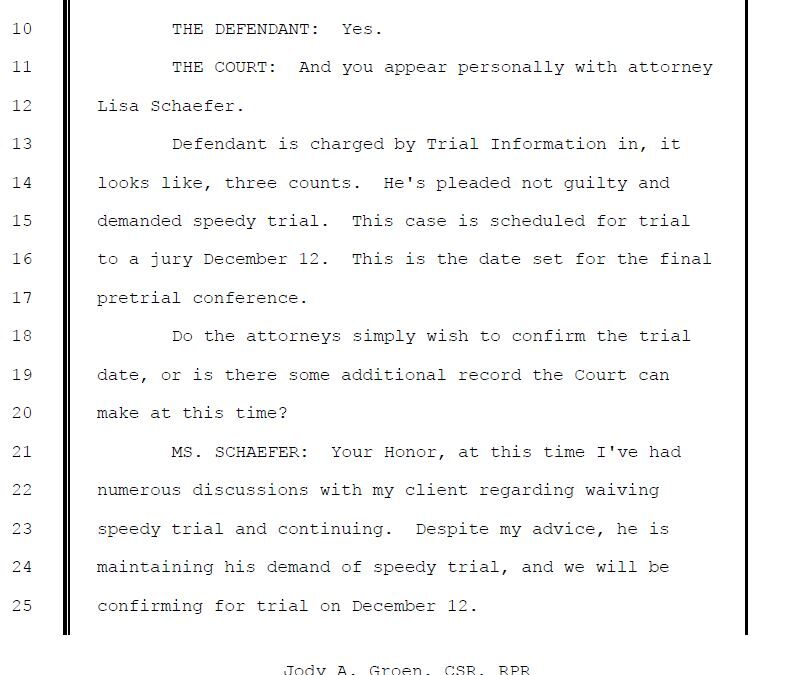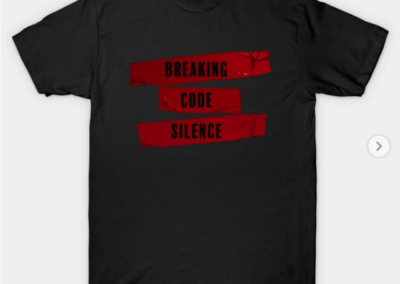In this post, we will review the next part of the sentencing where Ben Trane is called to the stand as a witness on his own behalf. For those of you who haven’t tuned in before, we welcome you to read Ben Trane’s testimony Part 1 and Part 2 from the trial to get a glimpse into previous credibility problems he had.
Ben complained that the information on the hard drive was critical to his defense.
Q. All right. With that in mind, did you hear the question when you were in court about the terabytes of information?
A. Yes.
Q. Tell us with regard to the terabytes of information, what did you understand was on there?
A. All the school records.
Q. Okay. And when you say all the school records, tell the Court what you mean by all the school records.Describe that to the Court, because the Court never had a chance to understand what that was.
A. So every student would have a file that would have every major incident report that they were ever involved in. It would have all their goals, their paperwork from their family rep, their school work, their financial information, their parents information, their psychological information, their medical information.
Q. All right. And was that information, as you heard your lawyer say, critical to your defense?
A. Vital.
Q. Did you get a chance prior to the start of the trial to review that information that was on the hard drive?
A. No.
Ben complained that he was given the run around and told he would have access to the hard drive.
Q. Im going to show you what is marked as Defendants Exhibit D. And tell me when did you get this document from your lawyer, what date?
A. She e-mailed it January 10th of 2018.
Q. And does this reference the hard drive or the depositions with regard to the case?
A. Yes.
Q. Which one? Does it reference the hard drive or the deposition?
A. Oh, sorry. The hard drive.
Q. All right.
A. And, I guess, the–I never saw the depositions either.
Q. All right. Could you tell the Court with regard to the hard drive why you never saw it?
A. I was told the first meeting I had with Lisa Schaefer that it would be produced and I would have a copy of it, and that was in September. In October I was told I was going to get it again. And in November I was told I was going to get it again. And there was an e-mail from Denise Timmins office saying that it would be overnighted. That didnt happen. And then later I was told I was going to–there were redaction problems with it, and we would get it later. And I was told I would have access to it repeatedly and never was given access.
Ben complained that he was told by his attorney that he never got to see the depositions and was advised by his attorney that the state would not pay for expert witnesses. One thing to note: The attorney did file several motions asking for more money from the state for the cost of a hard drive and the additional hours for her to work on Ben’s defense so she obviously did attempt to give him additional help in the little time he gave her.
Q. And in that it referenced the depositions. You never had a chance to review the depositions, did you?
A. No.
Q. You asked for copies after the trial date; is that correct?
A. Id asked for information–
Q. No. Listen to my question. You asked for them after the trial date, did you not–
A. Yes.
Q. –in response to this; is that correct?
A. Yes.
Q. And when you asked for them, what were you advised with regard to–is this consistent with what she sent you?
A. Do you want me to read it?
Q. No, you dont need to. The Judge has a copy. Were going to submit it as evidence. So I just want to know is this what she referenced?
A. Yes.
Q. And was that consistent with every request that you made for a hard drive, for expert witnesses, and for everything else that she was not going to make the request for?
A. Yes. She stated over and over again that the State wouldnt pay for such things, and I wouldnt have access to it.
Ben complained that he wasn’t made aware of all the consequences of going with a speedy trial or else he would have never chosen that. He claims he tried to say something at the pre-trial conference on 11/27/2017 about the hard drive but was cut off and claims that the prosecutor made a comment about him not waiving his right to a speedy trial but he was not sure if that was on the transcripts or not.
Q. Had the Court or–lets go back to this pretrial conference–your lawyer or Ms. Timmins explained to you what your rights would have been by waiving your speedy trial and what the consequences of not waiving them would have been, would you have waived them?
A. Yes.
Q. Was that ever done?
A. No.
Q. Did you ever see a single document in writing from your lawyer outlining the consequences if you did not waive your speedy trial rights?
A. No
Q. Now, youve heard Ms. Timmins ask the question about the pretrial conference and the waiver of the speedy trial, including the Judge indicated that he had a portion of the pretrial conference transcript that he had pulled up. And I believe the pretrial conference took place–and remember, we can only get into a portion of this because the Court has indicated we are restricted from doing this, so were only going to get into questions she brought up. And Im going to refer you to the pretrial conference that was held on 11-27-2017. Do you recall that pretrial conference?
A. Yes.
Q. Did Judge Kruse participate in that pretrial conference?
A. I dont believe so, but I cant remember.
Q. Do you remember seeing him at that time?
A. No.
Q. The pretrial conference your lawyer has down on her time records .50. Do you remember the pretrial conference?
A. Yes.
Q. Now, Ms. Timmins talked about it, and I believe the Court indicated in the portion of the transcript that there was an issue about a waiver of your speedy trial. And I believe theres another reference to a venue issue. Do you recall seeing Ms. Timmins at that pretrial conference?
A. Yes.
Q. At one point in the pretrial conference, did you make an attempt to interrupt your lawyer to speak?
A. Yes.
Q. And what did your lawyer tell you when you interrupted her to speak?
A. Im not allowed to talk at that time.
Q. Tell the Court at the pretrial conference what you were going to tell the Court about the discovery and about the hard drive?
A. That I hadnt had access to it, and that Ms. Timmins made a comment that–kind of a snorty comment that, well, then you should have waived your right to a speedy trial.
Q. So at that point your lawyer told you not to talk. Ms. Timmins told you that you should have waived your right to a speedy trial?
A. She didnt say it to me. She said it to the judge or Lisa Schaefer.
Q. You dont know whether that was put on the transcript or the record or not, do you?
A. It should be on record.
Q. But you dont know for a fact if it was?
A. No.
We have the pretrial transcripts that show that the lawyer did state that she did want him to waive the speedy trial and he was doing this against her advice. Screenshot is below.
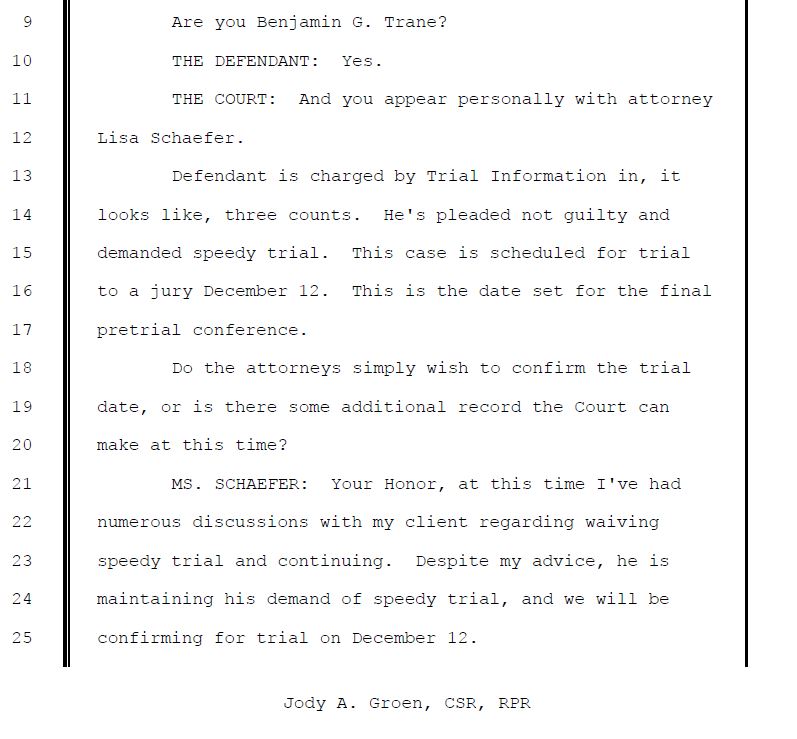
Ben Trane claims that on the “right level,” children had their own cell phones at Midwest Academy.
Q. You heard Ms. Timmins make a professional statement when she interrupted our presentation on the offer of proof about telephones being available in the facility; is that correct?
A. Yes.
Q. At Midwest; is that correct?
A. Correct.
Q. All right. Did young people have cellphones there, first of all?
A. On the appropriate level, yes.
Q. So when Ms. Timmins made the professional statement that cellphone records were not available to any people at Midwest Academy, is that accurate or is that inaccurate?
A. Thats inaccurate.
Ben Trane directly contradicts his own testimony at the trial which you can view here. The issue of cell phones was brought up during the trial and this is an excerpt from Ben Trane’s cross examination:
Q. As [sexual abuse victim]’s family rep, you controlled her phone calls?
A. Now, that’s not how phone calls — like, that word is not appropriate.
Q. Control?
A. Yes.
Q. Could [sexual abuse victim] make the phone calls without you knowing about it?
A. She could.
Q. How?
A. Somebody could have given her a cellphone.
Q. Well, the kids don’t have cellphones.
A. Staff. It’s happened. I mean, could things happen like that? Yes.
Q. If the rules are followed, could [sexual abuse victim] make a phone call without you knowing about it?
A. Yes.
Q. How.
A. Any type of therapy. Jane could have put her on the phone at any time.
Note that at no time does Ben Trane state that the victim could have had a cell phone at Midwest Academy on her own or borrowed one from her peers. In fact, the prosecutor mentions that children don’t have cell phones at the school and Ben Trane claims that staff could have lent them a cell phone.
In fact, the student handbook has a list of the privileges gained at each level. It specifically calls out that more phone calls are allowed with parents as the student moves up levels but it does not state anything about cell phones
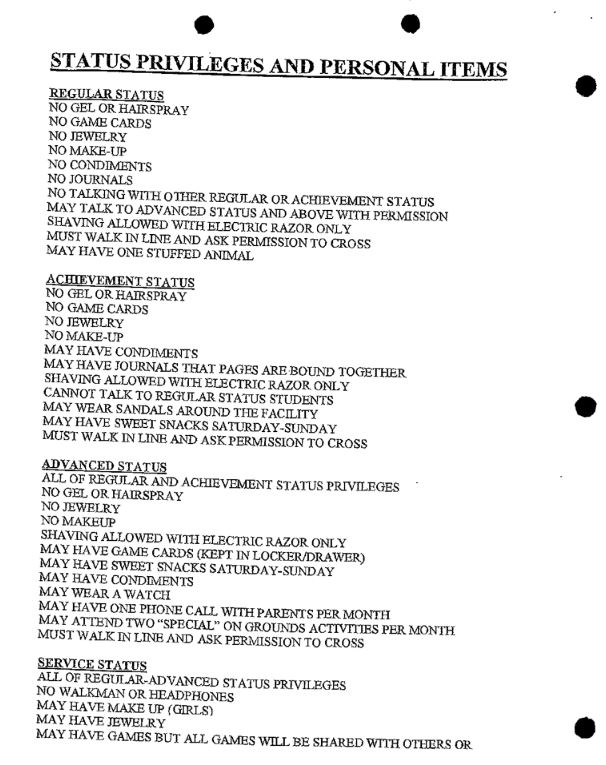
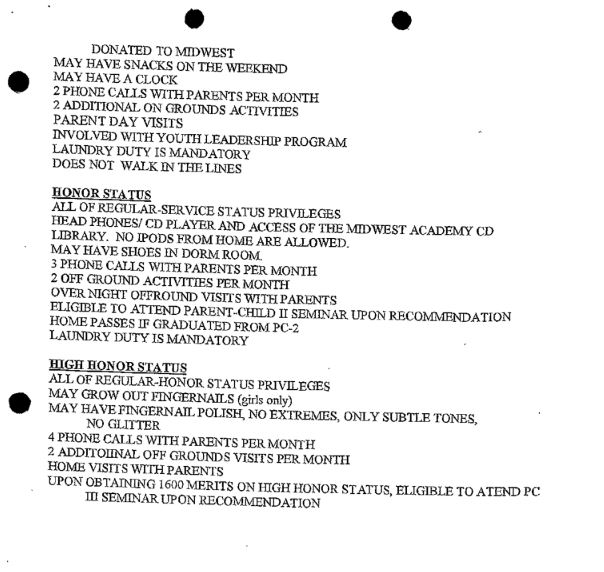
In that same handbook, there’s a list that includes the basic rules of conduct that ones again states that students cannot touch or talk into a phone without permission.
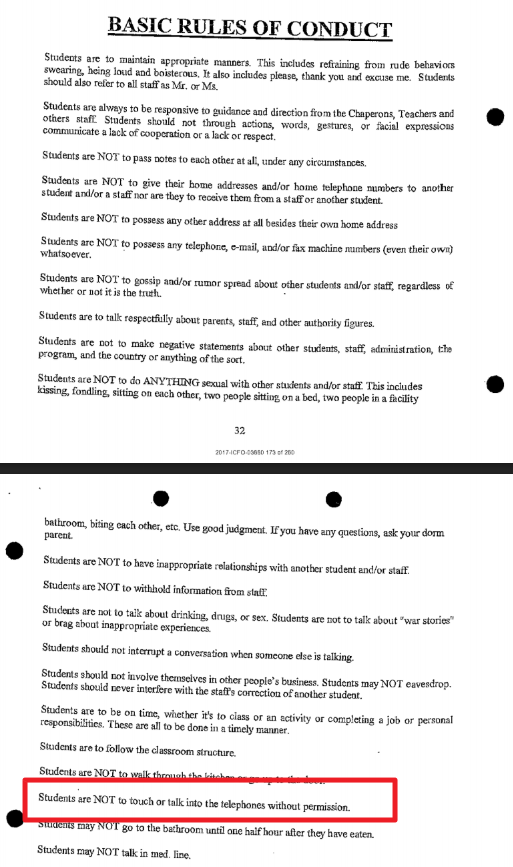
The Parent Manual had the similar information in it where parents were told that phone calls to the school will only be limited to the time outlined by family representatives.
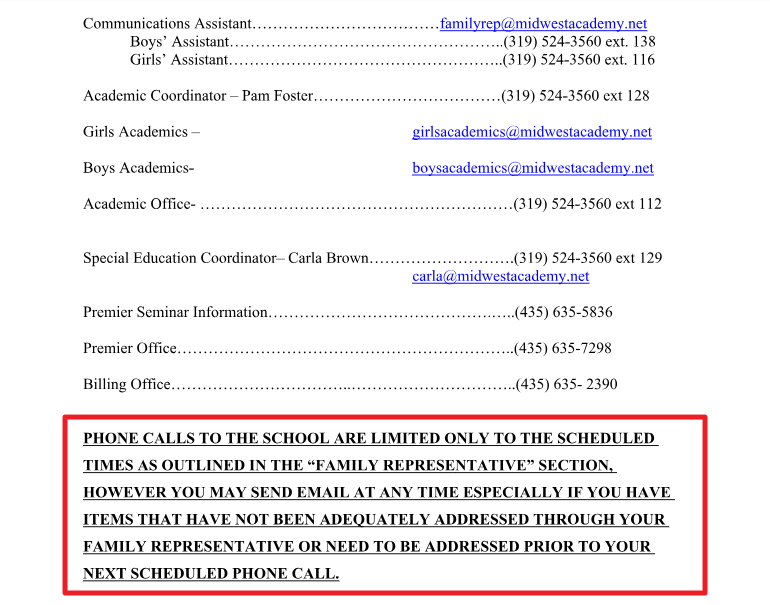
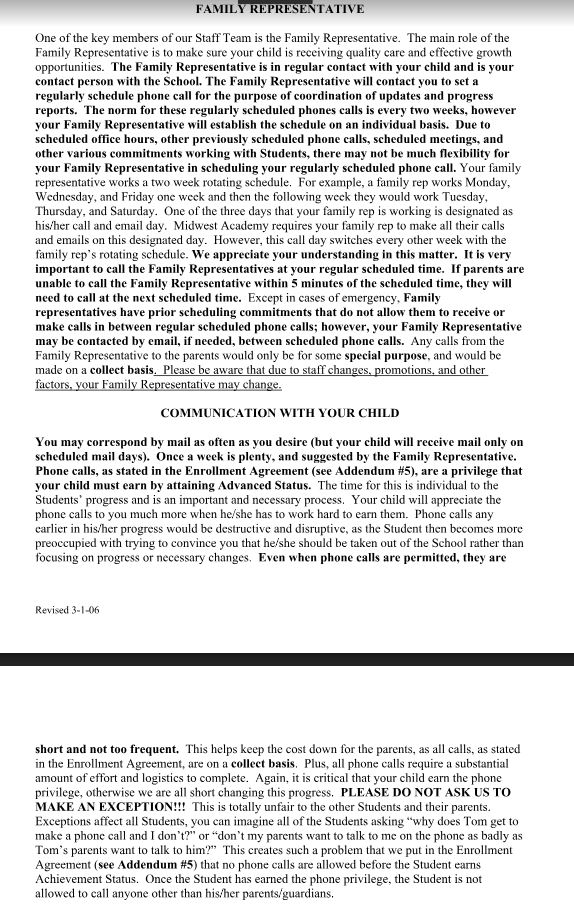
Parrish asks Ben if he had access to the victim’s cell phone records after she left the school. Nor should he because the victim of sexual abuse is not the one on trial.
Q. Second of all, were you aware that [sexual abuse victim] had access to a cellphone after she left Midwest?
A. Yes.
Q. And to your knowledge, had those cellphone records been made available?
A. No.
Parrish asks Ben about his old attorney disclosing her history. He didn’t ask one important question: Did Ben ask her any of these questions?
Q. Did she ever tell you that she never defended a sex abuse case in the past?
A. No.
Q. What about a child endangerment?
A. No.
Q. What about a pattern and practice case before?
A. No.

